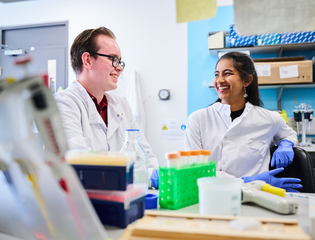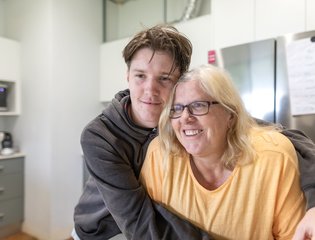Gilly's story: "I was in shock. I had no previous symptoms."
A post code lottery for cancer treatment
"My surgeon told me he could perform the operation, but that he didn't have the expertise to go to everywhere the cancer has spread - he could only go as high as my kidneys.
I wasn't told that there were other surgeons out there who could do the surgery I needed. I only found out through a friend.
I've met other women since my diagnosis who also got told they has run out of options.
Your postcode or the expertise of local surgeons should not decide your chance of survival.
Christina is my hero. I am incredibly grateful to her. During my first consultation with her, she looked at me, gave me a hug and told me 'I will be able to help you'. This was encouraging to hear and she gave me and my family hope for the future.
It's been 10 years since my initial diagnosis, and seven years since my recurrence. My cancer is under control and I am hopeful. Even though recurrence is always there in the back of my mind, I feel so lucky to still be here."
After an emergency admission due to abdominal pain, Gilly was shocked to be diagnosed with stage 4 ovarian cancer. Here she tells her story of her diagnosis, treatment and genetic testing, and how she is now nearly seven years post recurrence with no evidence of disease.
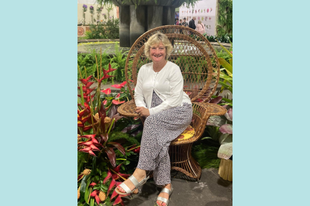
Gilly
I was diagnosed with ovarian cancer after an emergency admission to hospital suffering with severe abdominal pain, which was believed to be diverticulitis. Following a CT scan the next morning the general surgeon told me they had found a mass on my left ovary and he would refer me to the gynae-oncology team. He told me without any family members being present and would not answer any questions as it was outside of his area of expertise.
I was in shock. I had no previous symptoms. It was down to me to tell my husband and family. We were all in disbelief for the rest of the day. That night I consulted ‘Dr Google’ about OC and survival rates. It was not good reading. I felt real fear and felt very lonely/disconnected to the here and now.
I was in hospital for a week to manage the pain and to have other scans. I was not offered any counselling. One afternoon, my husband I were given a private room as I was so distressed mentally unwell – I felt so out of control. Why me? I wailed and ‘keened’ for an hour. That really helped.
After that, I put my big girl’s knickers on, and found deeply rooted determination to overcome this disease. Throughout my chemotherapy and surgery I stayed positive and committed to getting well.
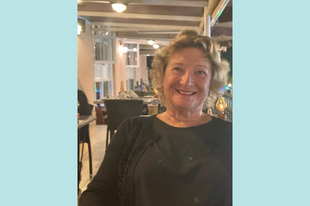
Gilly
The experience of surgery was immense! I had radical debulking surgery (twice) by a top London Professor. Although, she prepared me for it well, it is a very deep and invasive surgery and I was surprised how it affected my breathing. Also, being connected to tubes/catheters etc has a real impact on being independent and mobility. I worried that I might burst the scar! That said, I was discharged 5 days after my first surgery and 7 days after the second.
I saw the chemotherapy as my ‘elixir of life’. I decided that instead of seeing chemo as scary and debilitating, I’d look at it as a ‘super cure’ and considered that the infused drugs were my elixir of life. I pre planned for hair loss and prepared ahead to prevent any discomfort and nausea as best as possible. I am fortunate to live by the sea, and I was determined to get to the promenade every day. I had a mantra (Thank you sea for your energy, I will be cancer free). It was hard on a few occasions putting one foot in front of the other.
I treated myself to jam doughnuts, Reiki treatments and immersing myself in TV series and comedies.
The experience of being on the PARP inhibitor Zejula (niraparib) for me has been AMAZING! Although I had issues with low platelets initially, once put on the right dose, I have no known side effects.
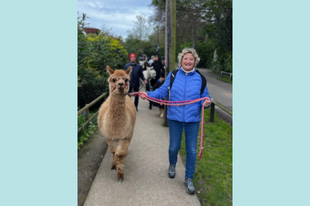
Gilly
The only slight negative is the need to have bi monthly blood tests taken at the chemo unit and 3 monthly consultations with my oncologist, so it reminds me that I am living with cancer, and when taking it every night I think is there is a subconscious impact of this.
However, after my first occurrence, the fear of recurrence featured heavily in my thoughts, especially at night, and it affected my sleep. When my disease did recur, I didn’t trust my body anymore. It took me a lot longer to get over the shock of the recurrence than the original diagnosis. I wasn’t sure if I could still be strong and positive. Having got over the fear of dying from the disease, these thoughts returned with a vengeance.
One thing that was very unexpected was finding out I carry a faulty BRCA1 gene.
When first screened at diagnosis I was not considered to have a gene mutation, but 3 years later I was informed that I was as many more people with my blood profile matched on the international database. I was really upset as it had implications for my family. However, as my daughter was found to have the gene fault, she was scanned and breast cancer was found – so actually knowing she was BRCA1 saved her life, as she would have not had a breast screen otherwise. She was 36 on diagnosis and has since had both ovaries removed. My son also has it. I have 5 grand girls and worry for their future.
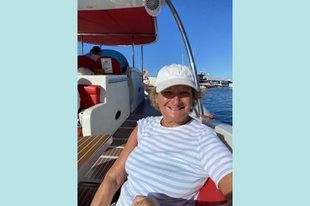
Gilly
Living with ovarian cancer now, with me being NED since recurrence for over 6 1/2 years feels different as I take a maintenance drug which is very effective. It’s my parachute. I feel that immediate access to counselling for both patients and carers would be beneficial; this is why I became a MacMillan Telephone Buddy, as I wanted to support others with their cancer diagnosis. Also, people should know that it’s ok to ask for a second opinion- If I hadn’t, I don’t believe I would be here today.
Once I had processed what was happening to me I was determined to live life to the full - Which I did, and do! Living with ovarian cancer has changed my outlook on life.
Gilly is part of the Ovarian Cancer Action Research Network. Your personal experience of ovarian cancer – as a patient, survivor or carer – can influence ovarian cancer research and ensure it is relevant to patients and their loved ones. To find out more click here

